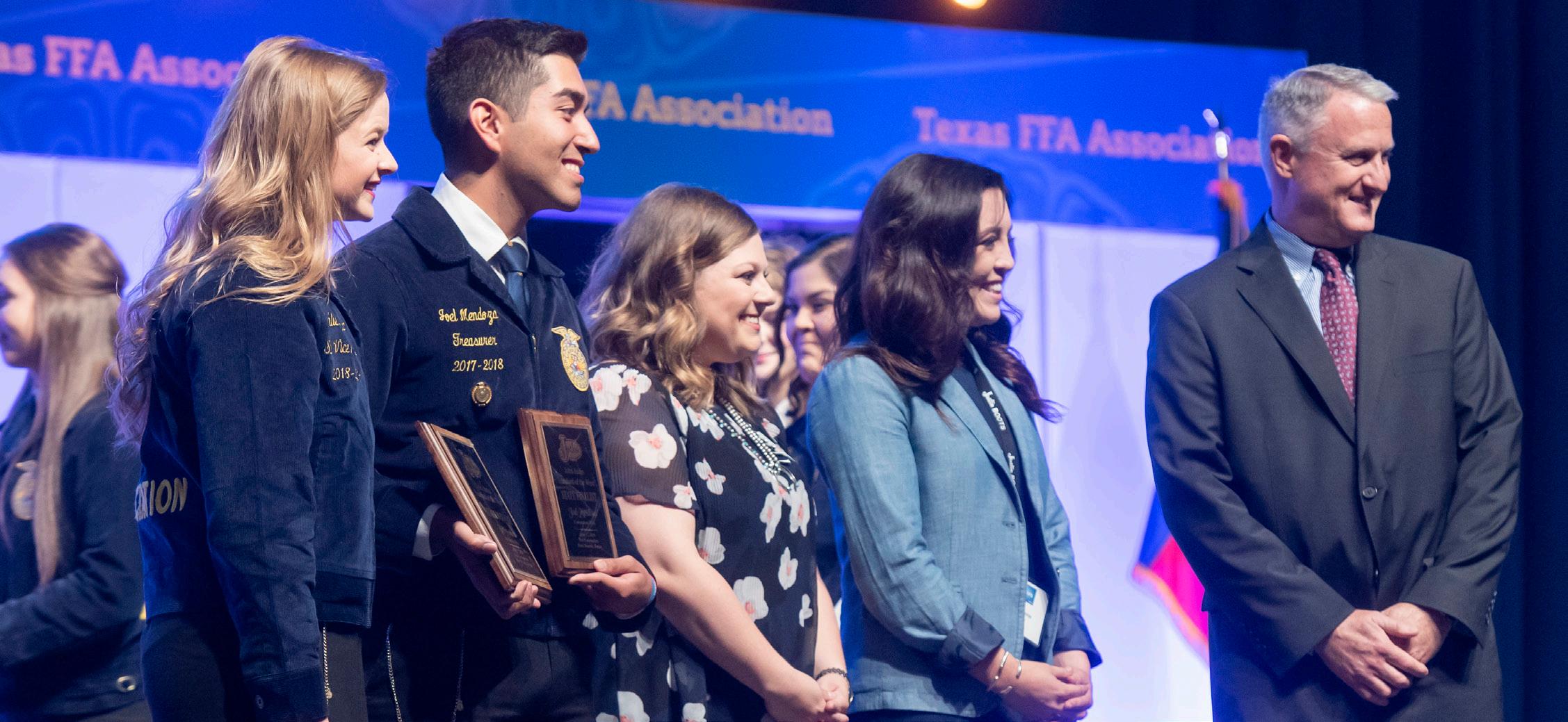
5 minute read
From the Ground Up
BY: GREG CROUCHLEY PRESIDENT AND CHIEF OPERATING OFFICER AT JUSTIN BRANDS
QUESTION: WHAT DOES A TEXAS FFA SUPPORTER HAVE IN COMMON WITH A TEXAS AG SCIENCE EDUCATOR? ANSWER: COMMUNITY.
Advertisement
In keeping with the FFA’s mission to make a positive difference in student’s lives by developing their potential for premier leadership, personal growth, and career success, this magazine has explored advocacy, development, and leadership, all subjects of critical importance.
As students develop these skills, the results build a lifelong community. The cornerstone of this community is unquestionably agricultural science educators.
By engaging with students at their most impressionable, you as agricultural science educators begin a quest by introducing or reacquainting, students to agriculture and the land. As Red Steagall has explained, “We live with the land, not on it.” His poem “Born to this Land” captures this core principle better than I ever could express.
Starting with basic agricultural science education, students begin their journey to premiere leadership, growth, and success. As you guide, nurture, motivate, and educate along the way, students develop a growing sense of responsibility, patience, emotional development, and character. This may be better expressed as “From the Ground, Up!”
In addition, in order for students to take full advantage of the opportunities ag education provides and reach their highest potential, they must interact with people across diverse disciplines, organizations, and skillsets.
Communication
Effective interaction is a complex and challenging skill that must be practiced often in order to grow. Learning how to communicate with others is essential to maximizing potential and achievement. It is clear the ag education and the FFA recognizes this, as skills such as public speaking are not only taught but also practiced repeatedly all year, culminating in the incredible presentations at the state convention.
It is absolutely critical for students across Texas, from the smallest rural towns to the largest metropolitan cities, to get the opportunity to study, learn, practice, and execute communication skills across different organizations.
Cornerstone
It is you, the agricultural science educators, who bring this all together.
By creating opportunities for growth through communication for every single student, from the shy and quiet to the most outgoing. By demonstrating for students how to create community through their own outreach efforts to the vast and diverse array of Texas FFA supporters.


As you bring supporters, old and new, into your community, the potential opportunities for each student grow exponentially. Ideally, each student is able to be presented with at least one opportunity that resonates, igniting the internal fire and passion to grow. The cornerstone to this most critical discovery for our students is the agricultural science educators.

You, as an advisor, are the finest example for students and supporters alike of the spirit of ag education leadership. Reach out to supporters and draw us deeper into the community you create. We can then match, recognize, and maximize each individual’s potential.
Reach Out To Supporters
Supporters are always eager to do more to participate in local communities. Working in conjunction with Texas FFA’s extensive contacts and relationships, there are five initial steps that might be useful to ag teachers when working to build up community support.
Contact Us! I can assure you no supporter is hard to reach when we hear “I’m an FFA advisor.”
Research and study our areas of expertise as they might impact your students.
Request meetings to introduce us to your students. Most ag education students seem to prefer questions and answer sessions to speeches or long presentations. Many of us are open to Zoom, or meeting in a big room.
Share your supporter contacts with other ag teachers.
“From the Ground Up” is building up communities to engage, enlighten, and excite each and every student is our common goal. You, as agricultural

science educators, are the cornerstone.
Teach Ag Tips
RULES AND PROCEDURES IN YOUR AG DEPARTMENT PART ONE: FFA CHAPTERS BY: RYAN PIENIAZEK, KRUM AND RAY PIENIAZEK, ATAT EXECUTIVE DIRECTOR
1. FFA Constitution and By Laws: Under Texas FFA policy, all chapters must maintain and submit a current constitution. Sample constitutions are available on the Texas FFA website. Constitutions must be filed with the Membership Coordinator of Texas FFA. The bylaws should address things such as officer selection, degrees, and maintaining membership in your chapter.
2. Officer Rules and Election Procedures: Officer Elections can cause many headaches for teachers. Elections must follow what your constitutions and bylaws allow. These should address what is needed to uphold and maintain each officer position. Be very clear as to how the voting procedures will take place.
3. Travel Policies/Permission Slips: Most districts will have policies on who can travel or go on a trip. Having emergency information and permission slips for students to travel is important. Who is paying for the trip and who will be responsible if the student does not go should be also communicated in writing.
4. FFA Calendar: Having a calendar planned for the year allows students, parents and administrators to know where you are going each year. It also allows you to plan hotels, vehicle requests and other important details.
5. Fundraising Procedures: In order to conduct a fundraiser, you may have to fill out forms with district as well as with the company. Having clear guidelines for your members to participate, when money is collected, when orders are due, how pickup will be handled, etc, is key.
6. Collecting Stock Show Entries: Collecting entries, required information, and signatures is very important. Create a process on how these will be collected. Have a verification time to make sure what is being submitted is correct.
7. Social Media: Knowing what can be and cannot be posted is important, including what your district allows to be posted and who can post to your social media accounts.
8. Procedures for Handling Funds: When collecting money, writing receipts is important for documentation. Depositing money in the school accounts will be required to be done in a timely manner. Know who to turn it to and what they require. When you can collect money could also be an issue. It may 5 need to be done before or after class or only after school hours.










